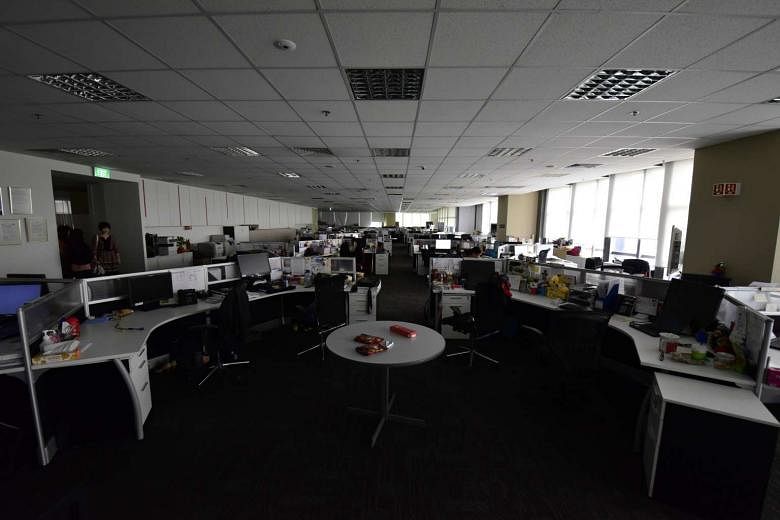SINGAPORE- It is mid-day and office product supplier Ricoh Asia Pacific Pte Ltd's office appears abandoned.
As the glare of the sun ricochets off the glass windows, it is all darkness inside.
That is because the company switches off its lights for one hour every day, at just after noon, when the staff leave for lunch.
It is the company's way of shining a light on environmental awareness.
For their light-saving practice and an array of other green initiatives, Ricoh Asia Pacific Pte Ltd won this year's President's Award for the Environment - Singapore's highest environmental l accolade on Tuesday (Sept 27).
The winners received the award from President Tony Tan Keng Yam at the Istana during an award ceremony.
In its 11th year, the President's Award for the Environment is an annual award organised by the Ministry of the Environment and Water Resources (MEWR) that recognises environment and water related contributions.
For Ricoh, which has been doing the lights off exercise for almost 10 years, its efforts is about raising awareness. "We don't save much, but we do it to show our commitment," said Ms Masayo Hada, 42, the company's deputy senior manager.
Once a month, all the lights and appliances at the office are also switched off at 7pm to conserve energy. "All the staff go off from work early that day and we don't work overtime on our monthly Eco Action Day," she adds.
The office, which has 130 staff members, also does not have individual waste bins. Instead there is one general waste bin at the pantry area and another centralised bin for all paper waste.
Ricoh's eco-initiatives are so well received that ministries, companies and even schools have toured their premises to learn more about how they save the environment.
Ricoh is also an active partner of external environmental initiatives, such as adopting the Tanjong Pagar Park and initiating and sponsoring the Butterfly Trail@Orchard project. The company also works with NParks and NEA to organise annual tree-planting activities since 2005 and to date, about 3,000 tree samplings have been planted.
The other two winners of the President's Award for the Environment this year are Marsiling Primary School and Bukit View Secondary School.
Over at Marsiling Primary School, environmental education is integrated into their school curriculum. In one school project, students learnt to compost coffee grounds to use as fertiliser for plants. They worked with neighbouring cafes and coffee shops to collect used coffee beans and turn them into useful compost for the school's garden.
Students also wrote letters to the neighbourhood vendors to request for coffee grounds that they would then process and package in school, said Ms Natasha Maidin, 40, the head of department for science at Marsiling Primary School.
Said vice principal Felicia Foo: "The whole idea is for them to understand that they belong to the community and they can do something about the things they see around them."
From giving out postcards to engaging in projects with the World Wide Fund for Nature, students from each cohort engage in various green initiatives.
Over at Bukit View Secondary School, students learn about the environment through the school curriculum too. The school constructed environment learning facilities, like an Eco Garden to teach students about biodiversity, water and energy conservation. The school created a rainwater collection system in its Eco Garden to collect rainwater for refilling the school pond.
The secondary school was the first school in Singapore to conduct a water rationing exercise with the Public Utilities Board to help students better appreciate water.
Said the head of department for partnerships Heng Chong Yong: "Through engaging our students in these Eco practices, we want to equip the students with knowledge and skills that are related to conservation of energy, water and the natural environment and to develop individuals to have a mindset for sustainable growth, thus they will be better prepared for the wide career opportunities available in the Green Sector."


